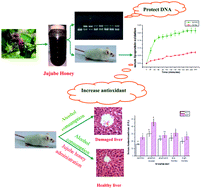Antioxidant properties of jujube honey and its protective effects against chronic alcohol-induced liver damage in mice
Abstract
The antioxidant potential of jujube honey, one of the most widely consumed honeys in China, has never been determined fully. In this study, jujube honey from six geographical origins in China was analyzed for individual phenolic acid, total phenolic content, and the antioxidant effect in chronic alcohol-related hepatic disease in mice. The results showed that jujube honey from Linxian of Shanxi province contained higher phenol levels, exhibited DPPH antioxidant activity, ferric ion reducing antioxidant power (FRAP) and protective effects against DNA damage. Treatment with jujube honey (Shanxi Linxian) for 12 weeks significantly inhibited serum lipoprotein oxidation, reduced the impact of alcoholism on aspartate aminotransferase (AST) and alanine aminotransferase (ALT). It also inhibited the generation of 8-hydroxy-2-deoxyguanosine (8-OHdG), lowered the levels of malondialdehyde (MDA) and increased the activity of hepatic glutathione peroxidase (GSH-Px). The study indicates that jujube honey exerts potent antioxidant activity and significant protection in hepatic disorders associated with chronic alcoholism. The protective effect is attributed to its antioxidant mechanisms and inhibition of oxidative degradation of lipids.


 Please wait while we load your content...
Please wait while we load your content...